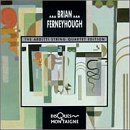| All Artists: Ferneyhough, Arditti String Quartet Title: String Quartets Members Wishing: 2 Total Copies: 0 Label: Disques Montaigne Release Date: 9/27/1993 Genre: Classical Styles: Chamber Music, Historical Periods, Classical (c.1770-1830) Number of Discs: 1 SwapaCD Credits: 1 UPC: 093046918729 |
Search - Ferneyhough, Arditti String Quartet :: String Quartets
 | Ferneyhough, Arditti String Quartet String Quartets Genre: Classical
|
Larger Image |
CD Details |
CD ReviewsMetacomplex string feast of anguised sound klangfarbenguy | 04/04/1999 (5 out of 5 stars) "When you hear Ferneyhough's music you say to yourself is the world really that horrible. And you think of the enormous intellect behind the music. Ferneyhough can justify every irrational act any millisecond any place in his music. The extremes of his aesthetic strategy is commonplace now. We are long past being shocked by the incessant shifting and promuligations of internal intertextual realtionships. My favorite here is the "Second String Quartet" and unabashedly I admit I love the structural beauty more than anything else. There is not enough said today when a music creator actually succeeds at articulating a form, a genre, as I find in this quartet. To a lesser degree I find this in the "Third Quartet" but I find its arguments more fluid, more statements emanating from the entire ensemble seem within his msuical language an accessible compromise. The other works seem all stepping places, bridges and transitory pages better left for study rather than hearing. Not enough can be said for Arditti's Herculean committment to this kind of music. I'm told once you learn it, all subsequent excursions are less arduous. On the negative side,( there must be one), is I don't think Ferneyhough has a grasp of the implications of structural complexity as he does the note-to note- rhythm- to rhythm texture to texture writing he engages." Great quartets of the 20th century klangfarbenguy | 10/29/2004 (5 out of 5 stars) "Brian Ferneyhough is one of the rare, late 20th-century ultramodernist composers to exhibit a sustained interest in the string quartet. Like Elliott Carter, Ferneyhough's quartets seem to mark important milestones in the composer's career.
The Sonatas, evidently inspired by Purcell, mark Ferneyhough's early compositional efforts. Laid alongside the later quartets I can't help but hear these as juvenilia. Well, extremely accomplished juvenilia. The second Quartet is phenomenal and is a concise statement of Ferneyhough's compositional interests. Here he is forcefully directing our attention to small, intricate details but never loses control of the formal structure. The way the instruments synchronize and are subsequently blown apart give important -- although fleeting -- moments of focus in an otherwise overwhelming world of sound. The sustained tension and anxiety of the quiet ending is chilling. The third Quartet is much more formally fragmented and juxtaposes many different kinds of music right next to each other. From the opening glissando explosion to the microtonal humming that follows, you know that you can expect the unexpected. In this, and to a greater extend in the fourth Quartet (with voice, on a Montaigne CD), Ferneyhough is engaging in a less linear discourse. The same forceful argument is there, but it is being delivered from a diverse series of viewpoints rather than one, commanding voice. Brian Ferneyhough has found an ideal interpreter in Irvine Arditti and his quartet. Like Ferneyhough's music, the quartet is full of maniacal energy, slashing violently through this music with aplomb. " |

 Track Listings (5) - Disc #1
Track Listings (5) - Disc #1